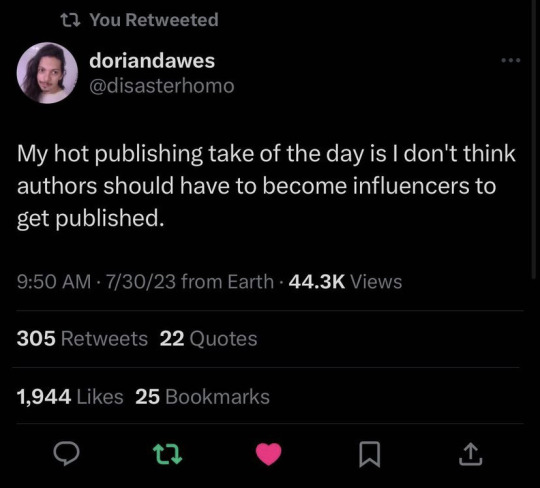Text
I imagine Avenger/Jaden saying this about JJ
I could fix him. I could make him worse. Good for you. I could gently take the weapon out of his shaking, blood-soaked hand and hold him until he finally believes that he doesn't have to be defined by all the ways the world has hurt him. Then we could ruin the lives of everyone who has ever treated him like he's a monster who doesn't deserve love.
48K notes
·
View notes
Note
Extremely helpful fight scene advice
How much detail should go into a fight scene to make it vivid but not oversaturated with information? If the battle is between two trained fighters then should the descriptions be more quick and to the point since the fight would likely be quick? Or would it be better to focus on quick thoughts and strategies leading to the action? How does change with sparring practice or novice attackers?
The best way to think about fight scenes is that they are a cathartic end to prebuilt tension. That tension can be created in a few paragraphs, a couple of pages, possibly even a few chapters, but the fight itself (no matter how tense it is) translates to catharsis for your audience. You build to the scene, have the fight, release the tension, and then new tension seeps back in as a result of the characters dealing with the consequences.
Regardless of how you stylistically choose to approach fight scenes on a sentence by sentence level, it’s important to understand how the scene itself behaves in broad strokes so you’re not accidentally releasing your narrative’s tension out of order.
As for how to write fight scenes, there’s no right way to do it except practicing to find the tempo that works best for you and for your individual characters. Personally, I find that clear images and short visual descriptions work best for both experienced characters and for novices. One of the main differences isn’t just the speed at which the fight is ended, but the level of comfort and confidence a character expresses in their narration. (Knowledge of advanced strategy and tactics on the part of the author also helps, but, remember, what you don’t know can be learned.)
Here’s a short snippet I wrote for two characters in a practice duel. Aysun, a well-trained young woman but inexperienced and has never fought a live battle, versus Leah, an experienced swordswoman who grew up in a rough environment fighting for her life.
Blade lit, Aysun hurled herself across the chasm between pillars.
Leah grinned.
They met in the center.
Aysun rushed forward.
Leah sensed the rising arm, the flaming blade pointed straight into a thrust; Aysun ready to let forward momentum carry her strike to victory. She slowed as Aysun landed, pivoted onto a diagonal as the blazing sabre seared past into empty air. Blade up, she struck.
The sensor on Aysun’s chest glowed red.
A horn blared.
“Out!”
So, what does Aysun do wrong? In her overconfidence against an unknown opponent, Aysun rushes in. Rushing is a common tactic you’ll see in martial artists who’ve only ever fought in safe environments because they don’t worry about getting hurt. This is a novice mistake, but also one you’ll see from people who should know better. When I set out to write Aysun, I decided she’d fight via tournament rules. That’s what she knows.
Meanwhile, Leah, being experienced, takes advantage of Aysun’s mistake. She starts by running and looks to Aysun like she’s also rushing, but this is just to lure Aysun in. As they get closer, Leah incrementally slows her pace to allow herself more control over her own momentum. The problem with rushing is that if you close the distance too fast, you can’t stop in time and you run into your opponent. Leah doesn’t bother to block or parry Aysun, as it’d put her at risk of being on the receiving end of Aysun’s momentum. Instead, Leah steps out of line, allows Asyun to go past, and utilizes Aysun’s overextension to claim victory.
(We are, of course, missing the entire setup where Leah baited Aysun into this bout.)
One of the major differences you see between experts, intermediates, and novices isn’t the usage of advanced techniques, but adept use of very basic ones. They don’t game out a fight on the fly because that takes time, instead acting on prebuilt strategies and relying on trained reflexes. With advanced fighters who regularly see combat, they’re more miserly when it comes to showing the audience what they can really do. They’re aware of the exterior consequences that persist outside of the fight.
Some common personality traits of advanced characters versus novices:
Advanced:
Decisive - what it says on the tin. They’re unlikely to hesitate when given openings and go straight for the kill.
Explosive - they shift from resting into violence quickly and without hesitation when they decide the situation calls for it.
Selective - probably saw this fight and that one coming and will move early to avoid as necessary. Injuries mean you can’t fight when it matters.
Confident - confidence comes from experience. They know what they do, and they know they’re good at it. Can be mistaken for overconfidence until seen in action. More likely to talk shit pre-game. They know the value of psychological warfare. Some variants may get a kick out using this confidence to piss off their opponents so they fight angry.
Practical - experience leads to realistic expectations. Experienced characters don’t need to prove themselves and know to save themselves for when it matters, so baiting is harder. Most of the usual shit talk will wash off. Also, more likely to punch someone in the shoulder because punching with a now swelling bruise hurts and slows them down.
Brutality - not guaranteed, but not uncommon either. Here again, we have psychological warfare.
Fatality - unless you’re looking at a situation where killing is not allowed, they’ll lean into this if circumstances require it.
Sophisticated Bodily Knowledge - they know where all the major arteries, important nerve clusters, and internal organs are. (Yes, this includes knowing that stabbing someone in the armpit or groin can cause them to bleed out.) Also what hitting them does and what hitting them feels like. They’re going to be more pointed and technical with their strikes depending on what they want. More likely to break the human body down into joints and ligaments. Understands small damage leads to big results.
Sophisticated Psychological Knowledge - less experienced characters are not likely to surprise them because they’ve seen the same tactics before. Humans aren’t that unique. A clever idea to a novice is an old song for the experienced fighter, and one they’ve probably tried before. Fighting is more than technical, its pattern recognition, and being good at it requires understanding people on a behavioral level to predict them.
Room to Play - this is simultaneously a do and don’t which depends on how strict the character is. May play with a less experienced character or character with no experience if they believe they can get away with it. They know their limits. Not advised, but nobody’s perfect.
Spends Time Practicing - the more skilled a character is, the more rigorously they practice and the more time they devote to developing their skills. While some characters are inclined to rest on their laurels, truly advanced characters know their edge falls off without training and understand the ceiling is without limit. They’re dedicated to their skills.
Chains Techniques - unless you have a character fighting with a bladed weapon, and even when they do, they’re unlikely to be one and done. Blocks create openings for counters. One strike opens the door to another three and so on. (Lots of writers mistakenly try to ping pong fight scenes to draw them out. Combat isn’t turn based. If an opponent isn’t providing suitable resistance to slow them down, they won’t.)
Considers Long Term Consequences - familiarity with techniques means understanding what those techniques do, what the long term consequences are, and how long it takes to recover from them (if they can be recovered from at all.) The same goes for battle. Violence is escalation. Characters who solve problems with violence should face escalating problems further down the road as a result of their actions.
You might be thinking male characters, but this list is gender agnostic. It’s important as a writer not to buy into a skilled character’s bullshit. They’re working very hard to convince the world they’re invulnerable, but that doesn’t mean it’s true.
Novices:
Optimistic - trends for a more romantic, rosier view of martial combat. Experience with the human condition hasn’t knocked it out of them yet.
Indecisive - for most people, it’s not easy to hurt another human being. To see their pain and suffering and to know you caused it. Novices are more likely to hesitate, more likely to ignore openings given if they don’t like the potential outcome, more likely to extend fights to their own detriment, and take hits they don’t have to. Less likely to seize the initiative and, if they do, not great at holding onto it against experienced opponents. They haven’t fully realized they can’t afford to be nice outside of safe, training settings.
More Tells - everyone has tells, but the less experienced a character is then the more obvious their tells are and the more they have. This can be everything between the way they stand to their techniques generally being larger in motion, more obvious in the early movements of the musculature, less energy efficient, and, comparatively, much slower than their experienced counterparts.
More Likely to Flinch - combat hurts coming and going. It hurts to receive hits, but it also hurts to hit someone. The closer you are to bone, the more it’s going to hurt. The harder you hit, the more return vibrations you receive. Beyond movement, these vibrations are what wears out your muscles in prolonged combat. (It only gets worse with weapons.) Proper technique diminishes some of these damaging returns, but not totally. Inexperienced characters will stop to go, “ow, that hurts.” You’ve probably seen characters on television shaking out their hand after hitting another character, that’s what this is. Pain. Inexperienced characters and novice characters are both less capable of pushing past the pain because their training hasn’t covered it or they don’t know to expect it.
Plays Around - there’s a point between novice and intermediate where someone’s learned enough to be dangerous (mostly to themselves)but not yet realized how little they actually know. This leads to overconfidence and overconfidence leads to playing around.
Less Advanced Body Knowledge - more likely to demonstrate less sophisticated knowledge of the human body, unlikely to break the body into pieces, and focus only on the major points like stomach, heart, head. Less focus on exterior limbs and joints, not a lot of thought given to pressure points outside the groin, less common arteries, or damaging musculature to debilitate. Might realize preemptive opening blow to the throat is good, but probably not thinking in those terms yet.
Less Advanced Psychological Knowledge - they don’t have the experience to pick up on the more subtle psychological games and are more likely to be baited. (If you’ve got an MC like this, it’s important to let them make their mistakes. Mistakes build experience and audience street cred.)
One and Done - most martial schools will train blocks and counters early, along with technique sets, but for true beginners chaining unfamiliar techniques won’t feel natural and there’s more likely to be gaps in their combat flow.
Easily Overwhelmed - much more likely to not understand what is going on or for the pacing of combat to fly out of their control.
Few Considerations For Long Term Consequences - novices have the luxury to be hot headed. They haven’t learned about the debilitations of long term injuries or even just the damages caused by small ones. They’re easier to write because they’re more likely to jump in with wild abandon, are met with more surprises, and have an easier growth trajectory for their character arc.
As a writer with no combat or limited martial experience, you’re more likely to start out thinking like a novice when structuring your scenes. While humans are very impressive creatures, it’s easy to overestimate what the body can fight through in comparison to damage received, especially against skilled opponents.
Ultimately, clarity and specificity in how you deliver the visual image combined with the sensation of the character’s combat can provide an entertaining fight scene. This is dependent on your writing, if you focus too much on technical details like sentence structure and not enough on the content and building up character’s decision making then the scene itself might fall completely flat.
Fight scenes are an extension of a greater whole. They’re the frosting on the cake, but the cake’s got to be tasty to begin with. Like martial combat in the real world, there’s no shortcuts, just a lot of hard work. Try, fail, reassess, try again. With practice, you’ll find your rhythm.
Michi
This blog is supported through Patreon. Patrons get early access to new posts, and direct access to us through Discord. If you’d like to support us, please consider becoming a Patron.
516 notes
·
View notes
Text
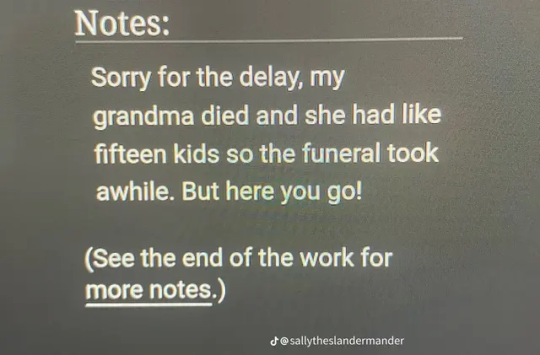
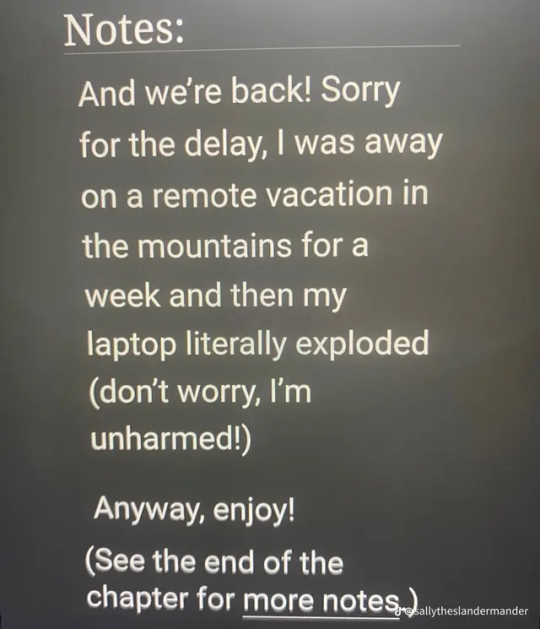
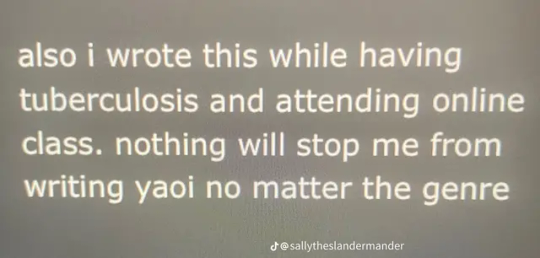



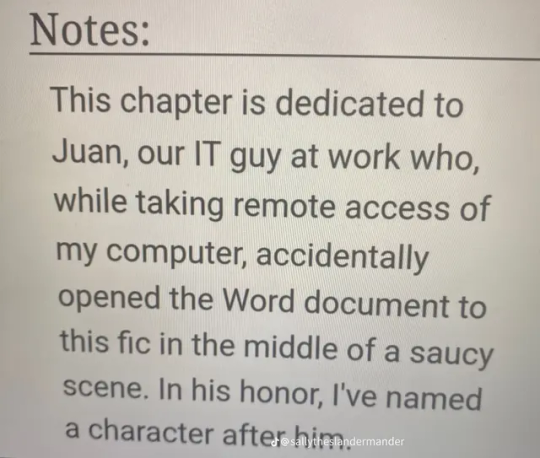
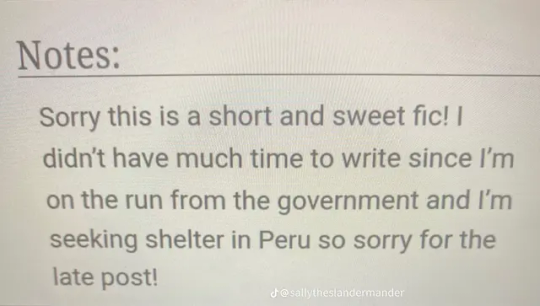
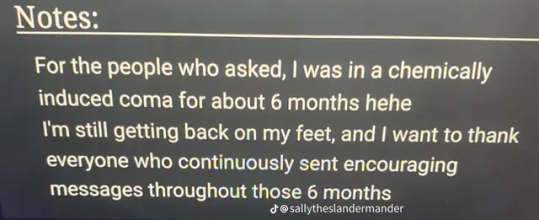
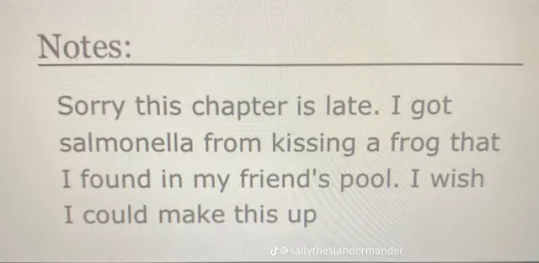
209K notes
·
View notes
Note
AITA for wanting grapes at a lemonade stand?
So I (Duck) really wanted some grapes, and there was a nearby stand. But when I went there, the man at the stand said they sold lemonade, so I waddled away and came back the next day. He said then that again, they don’t sell grapes. So I left and came back again, but he just offered lemonade again. I did this a couple more times before asking if he had any glue or grapes. This time he just laughed it off, and took me to the store to buy some grapes, but I wasn’t really in the mood for grapes anymore, and just wanted to know if the store had any lemonade. So, AITA?
164 notes
·
View notes
Note
He does... if he would stop being such a simp LOL
AITA for not telling my wife that her ex boyfriend is still alive?
I (42M) married my beautiful wife (42F) 7 years ago and our marriage has been relatively stable, though we are both very busy with our careers. Before we were together, she was dating one of our former coworkers (we were all in a team of soldiers together when we were in our teens and early twenties). They'd been crushing on each other for a long time and had just started dating when he decided to leave our team to become an independent vigilante. They continued their relationship despite the distance, but he quickly became unstable and self-destructive. He never harmed her directly, but seeing him like that was taking a massive toll on her. I was her friend through it all, and I never tried to be more than that even though I've been in love with her for just as long as that other guy has. Then one day, they went on a mission together that went horribly wrong, resulting in his supposed death. She was inconsolable. However, in the years since then, she and I got closer and eventually she fell in love with me.
I thought that everything was resolved, but I was sent to check in on a new patient the other day (I'm a doctor) who was part of a group of patients suffering from a mysterious poison. The unconscious man in the room was none other than my wife's ex boyfriend. His medical records proved it.
The group of people recovered, which means that the former love of her life is somewhere out there right now. I don't know how she would react if she found out if he was still alive. Their relationship was awful, but part of me is still afraid that if she knew he was out there, she might run back to him. At the very least, it would cause her a significant amount of emotional turmoil. So, I decided not to tell her. If he's managed to stay away for this long, then they probably won't run into each other again, and we can live our lives in peace. But this decision wasn't an easy one. AITA?
10 notes
·
View notes
Text
That is interesting... I am unfortunately way too caught up in "being good", and I get discouraged if I don't think my art is good... guess how often I draw? Almost never :((. I want to start making art the way he does
{video description: a man standing in front of an abstract painting in-progress.
"One time I told a friend that I enjoy painting, and his response was, 'Oh yeah? Are you any good?' "
And I was stymied in the moment, and I just today realized why.
Pretend instead of painting, I had said, 'I really enjoy going on walks.'
And then he had responded, 'Oh, are you a pretty skilled walker?'
What?! That doesn't follow. People go on walks to feel good not to be good. Not everything is about improvement or skill.
If i wanted to be good at painting I'd have to worry about composition, color theory, texture...taking care of my tools instead of just dumping them into a milk jug of water that I never rinse out.
I'm bored just listing that sh*t, let alone doing it.
If I had to be good, I would quit.
I paint because it takes me out of myself. The end result doesn't even really matter.
I'm sure some of you relate. That's why we get along. Thanks for listening, see you tomorrow!"
via @ abrahampiper on Tiktok}
#somebody take away my perfectionism please#except not really because I'm convinced that's what makes me good at things and I need to be good at things#i need therapy
189K notes
·
View notes
Text
This is the coolest life advice tbh, I need to be more like that
"Stop saying 15 year olds with weird interests are cringe, they're 15" this is true however you should also stop saying adults with weird interests are cringe because who gives a shit
243K notes
·
View notes
Text
I don't not love double negatives.
#I thought of this and just wanted to share it because I thought it was funny#I'm sure a million people have said this before but yknow what I'm going to say it again#I plan to continue with the puns and bad jokes so buckle up
2 notes
·
View notes
Text
Not me in a Hunger Games phase again...
Thinking about how incredibly brave it was of Suzanne to make the main love interest a kind, sensitive, emotionally intelligent, disabled, stocky blond in 2008 when the trend at the time was skinny, tall, lanky, sarcastic, hates-everyone-but-main character, rageboy. And how absolutely genius it was to have BOTH of those types in the same series and have Katniss choose Peeta. Groundbreaking.
5K notes
·
View notes
Text
being a writer is being in a constant state of breakdowns
127 notes
·
View notes
Text
A major theme in media made for kids is "Listen to your heart, follow your heart, it knows what you need". I think growing up is about realizing that that message is total bs.
#my heart wants toxic people that my brain kicked out for a reason#if you don't consciously orient your heart towards The Good then it will give you bad readings#deep quotes#growing up
9 notes
·
View notes
Text
I finally finished the buildup to the main climax of my WIP that I've been thinking about for years!! It is now time for me to not know how to write it despite having thought about it for years
#writing#writeblr#creative writing#creative writing memes#relatable#someone please help me#when will I finish this WIP please I really want to
7 notes
·
View notes
Text
Me every day
If you're looking for content though, I may not have actual content out in the world, but my bestie @guardian-of-time-if does!! So go check out her stuff!
Feeling the compulsive urge to post about my oc's as if they have an established fanbase and aren't actually from wips I haven't even introduced on tumblr yet
22K notes
·
View notes
Text
I Won
Today in class my professor was talking about Nicola Tesla's ethnicity and how he used to alternate between saying he was Serbian and saying he was Croatian, and I said "Haha, he alternated it like the current!" The whole room groaned and my professor rolled his eyes and called it "The Daddyest Dad Joke".
I don't know how I feel about that label, but it's mine. I own it. I told The Daddyest Dad Joke, and no one can ever take that away from me.
1 note
·
View note
Text
Me every day
Would be asleep right now, but there are Fictional Characters to imagine in emotional situations. You know how it is.
93K notes
·
View notes
Text
Absolutely not. I've never known such a person. It totally isn't me either.

77 notes
·
View notes
